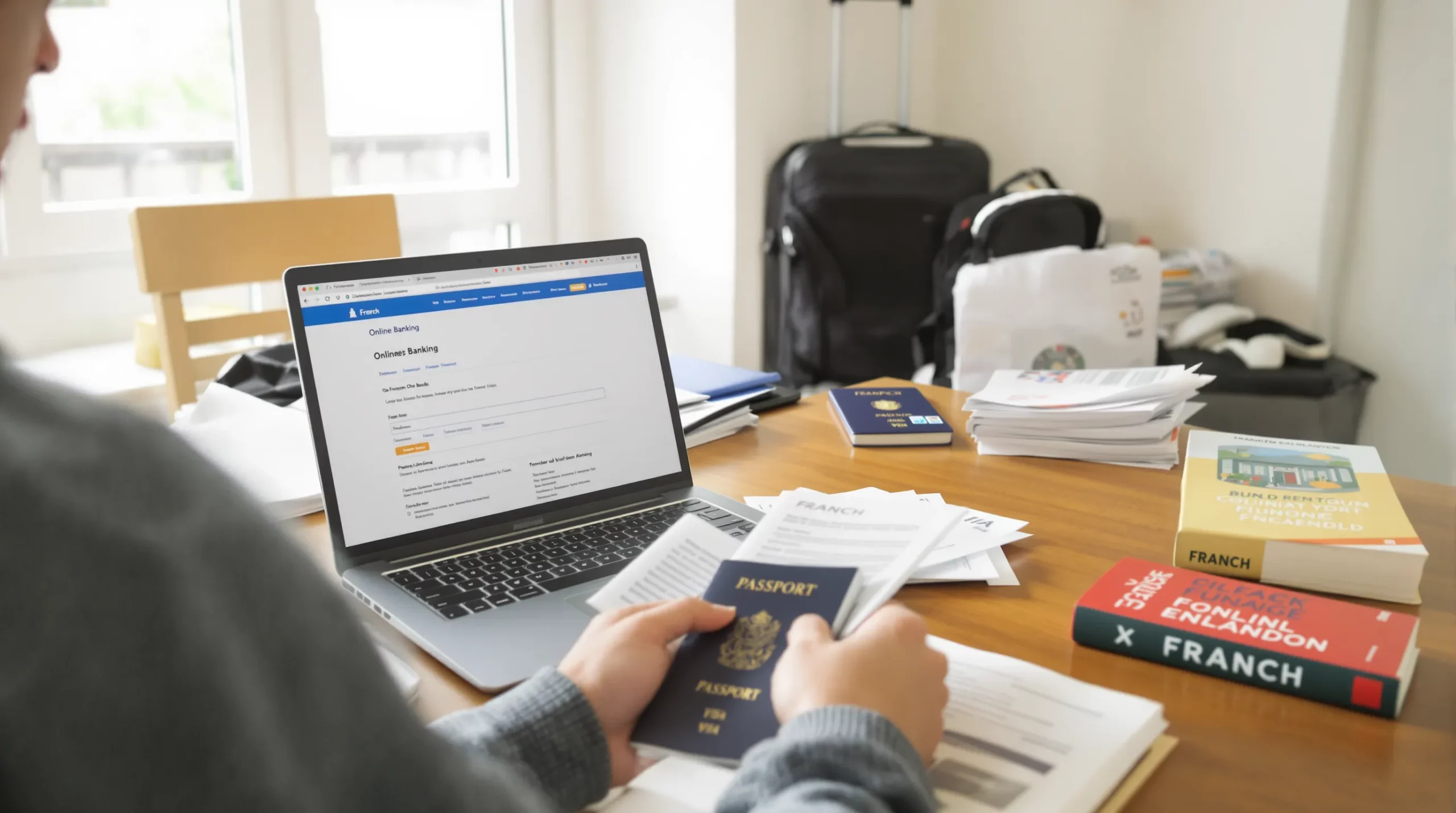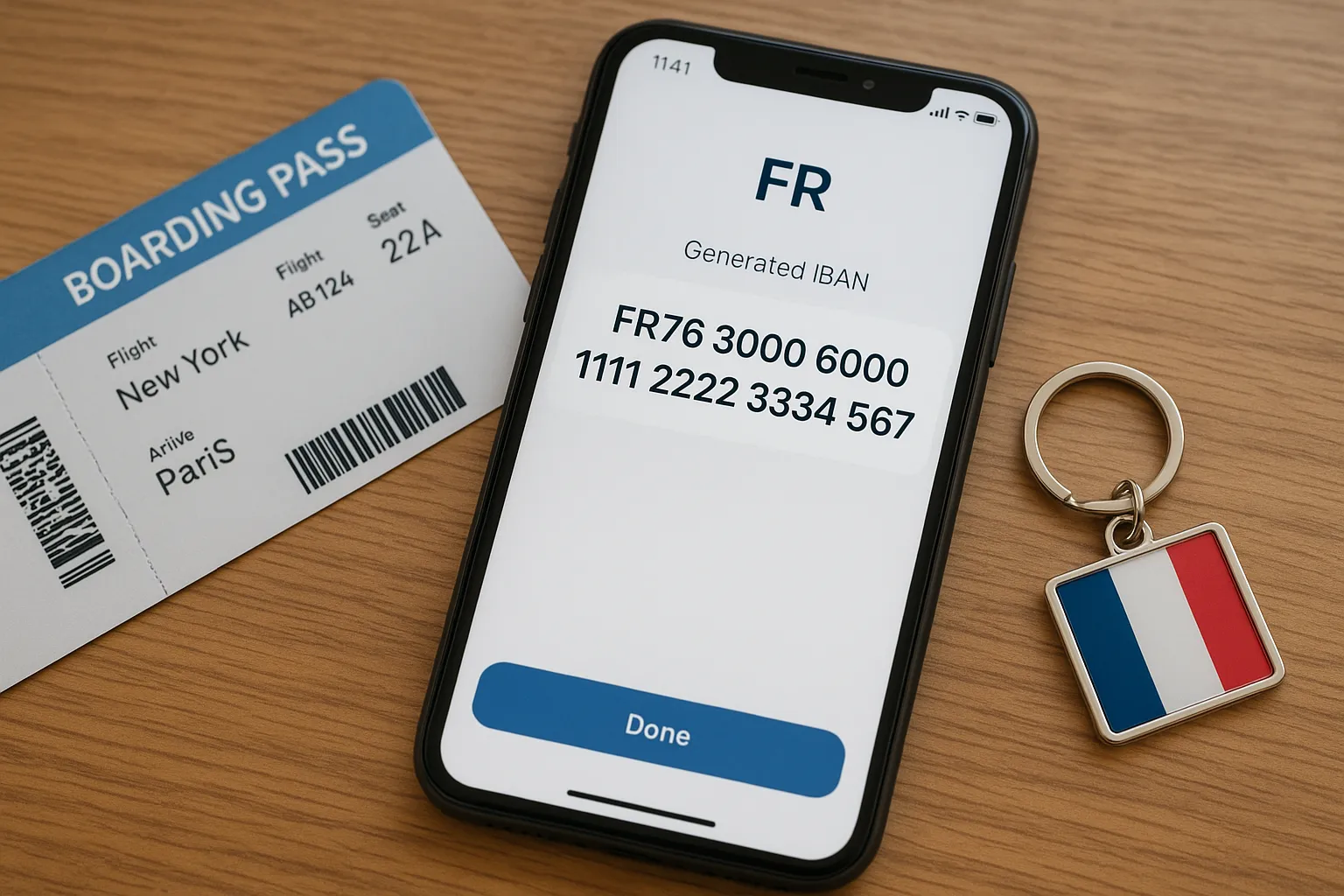Opening a French Bank Account Before Arrival: Remote Options Compared

Why bother opening a French bank account before you even land?
If you are preparing a visa application, a work contract, or a long-stay residence permit (VLS-TS), French authorities will sooner or later ask you for French bank details (an IBAN commençant par FR). Landlords, utilities and sometimes employers request the same thing. Opening the account after arrival sounds easy—until you discover that:
- You need proof of a French address to open the account… yet you need the account to rent an apartment.
- Prefecture staff often ask for a recent French RIB (relevé d’identité bancaire) as part of the notorious paper chase.
- Waiting rooms are full, and banks have tightened compliance for foreign nationals since 2023.
Remote account opening short-circuits this chicken-and-egg situation. Below we compare the main options available without setting foot in France and explain the documents each provider will require in 2025.

1. Understanding the legal backdrop
- KYC & AML rules. French banks must verify identity (KYC) under EU anti-money-laundering directives. Video calls, liveness checks and certified scans have been legally accepted since ACPR Instruction 2021-01.
- Tax residency declarations. You will be asked to fill out a CRS/FATCA self-certification. Non-EU nationals should expect additional questions about the source of funds.
- Right to a basic account (droit au compte). This constitutional right applies only once you are resident in France. So until you have a local address, banks may legally refuse your application.
Translation: the only realistic path before arrival is a bank—or electronic money institution (EMI)—with a business model specifically built for non-residents.
2. Four categories of providers that work from abroad
| Provider type | Typical IBAN | Who can apply? | Key advantages | Main limits |
|---|---|---|---|---|
| International branches of French banks (e.g., HSBC Expat, BNP Paribas International)** | FR or LU | High-income clients, 100+ countries | Full-service banking, French cheque book | High opening deposit (€10 000+), steep fees |
| French online banks (Boursorama Banque, Hello bank!, Fortuneo) | FR | EU/EEA residents, a few third-country nationals | Zero or low fees, classic bank status | Usually require EU tax residency; video-KYC only in French |
| Neobanks / EMIs with French IBAN (Wise, Revolut FR, Lydia Comptes Pro) | FR | 180+ countries depending on provider | 100% remote, instant IBAN, multi-currency | No overdraft, no cheque book, limits on cash deposits |
| Pan-European neobanks (N26, Bunq, Monese) | DE, NL, GB | 30–200 countries | Quick onboarding, mobile apps in English | Some French landlords and prefectures still prefer an FR IBAN |
Data sources: provider price lists (June 2025), ACPR register of payment institutions.
3. Deep dive: strengths and weaknesses of each route
3.1 International divisions of French banks
- HSBC Expat (Jersey) and BNP Paribas Global Network market “France pack” accounts that include an FR IBAN, a platinum card, and mortgage assistance.
- Phone or video onboarding is available to nationals of 120+ jurisdictions.
- Expect: notarised passport copy, proof of income over €40 000/year or assets >€50 000, and an initial deposit around €10 000.
Good for executives relocating on a work permit. Overkill (and overpriced: €25–40/month) for students or freelancers.
3.2 Classic French online banks
Boursorama Banque, Fortuneo and Hello bank! dominate comparisons because they charge no monthly fee. Since 2024, they all accept video-KYC with a foreign passport and an overseas address—but only if you are already tax-resident in the EU/EEA or the UK.
- Minimum opening deposit: €50–€300.
- Instant RIB once your ID and selfie are approved.
- VLS-TS applicants from the US, India or Nigeria are usually declined at the compliance review step.
Tip: if you can borrow a temporary EU address from a relative, this route is cheap and fast. Just be ready to explain inconsistencies when you register with the French tax office later.
3.3 Neobanks/EMIs with an FR IBAN
Wise, Revolut France and Lydia leverage e-money licenses to issue French IBANs while keeping onboarding 100% mobile:
- Supported passports: 170–190.
- Documents: passport scan + selfie; proof of home address in any country; sometimes a secondary ID.
- Account activation within 10–20 minutes.
- RIB is accepted by most landlords, telephone operators and the majority of prefectures (Paris, Rhône, Hérault). Marseille and Seine-Saint-Denis still demand a “real bank”, though a Wise statement often passes after escalation.
Fees (June 2025):
| Provider | Monthly fee | SEPA transfers | Card delivery | Cash withdrawal |
|---|---|---|---|---|
| Wise Personal | €0 | €0.28/transfer | €7 | 2 withdrawals free then 1.75% |
| Revolut Standard (FR) | €0 | Free | €5 | €200/month free |
| Lydia Bleu | €4.90 | Unlimited free | €10 | 3% after €300/mo |
For student visas and Passeport Talent salaries, this is the easiest option.
3.4 Pan-European neobanks (DE/NL/GB IBAN)
N26 (German IBAN) and Bunq (Dutch IBAN) remain popular because English-language support is better than most French banks.
Pros:
- Onboarding from 30+ non-EU countries.
- Premium plans include travel insurance for Schengen visas.
Cons:
- A few utility companies reject non-FR IBANs despite SEPA regulation 260/2012 (illegal but common).
- Some prefectures outside Île-de-France still insist on a French IBAN for residence-permit renewals.
Work-around: present proof of regular incoming salary transfers to that IBAN and, if challenged, quote Article L133-8 of the Monetary & Financial Code stating that IBAN discrimination is prohibited.
4. Which documents will you need in 2025?
Regardless of the provider, prepare these scans in advance:
- Biographical passport page (valid 6+ months).
- A second ID (national card or driver’s licence) if available.
- Proof of current address outside France (utility bill, bank statement, lease contract, dated <3 months).
- For U.S. citizens: completed W-9 form; others: CRS self-cert.
- Optional but helpful: letter of admission (students) or work contract to justify the “purpose of the account”.
Having the PDF versions handy will cut onboarding time from hours to minutes.
5. Is a neobank RIB accepted for French immigration and day-to-day life?
Bank status matters more than logo. Under French law:
- Payment institutions and EMIs can issue IBANs and are supervised by the ACPR, the same watchdog that oversees BNP or Société Générale.
- Prefectures’ internal memos rarely distinguish between banks and EMIs, but individual clerks sometimes do. Bringing the ACPR registration certificate (downloadable from Regafi.fr) usually settles doubts.
Real-world feedback from ImmiFrance clients (Jan–Jun 2025):
| Prefecture | Wise FR IBAN | Revolut FR IBAN | N26 DE IBAN |
|---|---|---|---|
| Paris | Accepted 95% | Accepted 97% | Accepted 88% |
| Lyon | Accepted 92% | Accepted 94% | Accepted 70% |
| Marseille | Accepted 60% | Accepted 55% | Rejected 40% |
Source: ImmiFrance case-tracking dashboard, 524 residence-permit files.
Bottom line: a French IBAN neobank has a >90 % acceptance rate in most urban prefectures. Non-FR IBANs still face resistance in the south-east.
6. Step-by-step roadmap to open your account from abroad
- Pick one main provider + one backup. If your first choice flags your file for manual review, you can switch without losing a week.
- Collect digital copies of all documents in PDF or JPEG under 4 MB.
- Complete the video-KYC session. Good lighting and a neutral background reduce retry loops.
- Fund the account with €20–€300 using a debit/credit card or SWIFT transfer.
- Download the official RIB (PDF). Save it; French forms still love paper.
- Keep the app active. Many neobanks require one login every 90 days to avoid soft freezes.
7. FAQ myths briefly debunked (without the full FAQ section)
- “I heard neobank IBANs don’t work for CAF housing benefits.” They do, provided the IBAN is in your name and SEPA-compatible. The CAF information system updated its IBAN validation tables in February 2025.
- “Opening an account abroad hurts my tax status.” No. You only become tax-resident in France after 183 days or if your main economic interests are there. Just declare the account on Form 3916 once you file your first French tax return.
- “Prefectures can refuse an EMI IBAN.” They sometimes do, but presenting the ACPR certificate and, if needed, the SEPA regulation usually resolves the issue.
8. How ImmiFrance can help
- Our consultants review your visa or residence-permit application and flag documents—like bank statements—that often trigger prefecture doubts.
- Through our partner network, we can introduce clients to neobanks already recognised by the prefectures where we operate.
- Real-time case tracking lets you upload your RIB directly into your secure ImmiFrance space so that our lawyers can include it in the submission bundle.
Ready to tick “French bank account” off your to-do list? Create your secure account on ImmiFrance and book a 15-minute onboarding call: https://immifrance.com

Opening a bank account from abroad is no longer a privilege reserved for executives. With the right provider and a clean PDF of your passport, you can get a valid French IBAN in under an hour—and walk into your prefecture appointment one administrative step ahead.
